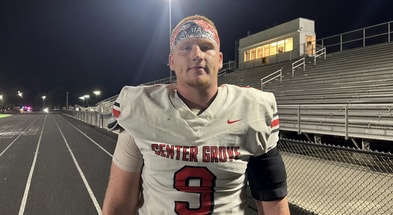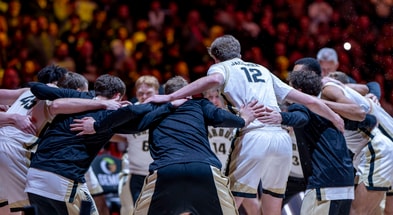"I get chills, I get goosebumps" Purdue's magical win over Ohio State resonates five years later as Tyler Trent's story continues
If you put David Blough before a group of strangers and told the former Purdue quarterback to explain what transpired in 2018 at Ross-Ade Stadium during an October evening against mighty and powerful Ohio State, what would he say?

“When you just asked me that, I get chills, I get goosebumps,” Blough said. “I get that feeling … this is bigger than me. It was always bigger than us and his story was supposed to play out exactly how it happened.”
The stories, highlights and moments from the 49-20 shellacking by the Boilermakers over the second-ranked Buckeyes are memories that will never fade. A sold-out stadium and an ABC national television audience watched the home team put on a clinic against Urban Meyer’s high-powered group and future top draft picks as Blough, running back D.J. Knox, receiver Rondale Moore and others carved up the Buckeyes.
The exclamation point was linebacker Markus Bailey’s interception return for a touchdown, a fitting conclusion to one of the top games in program history for the native of Columbus, Ohio. Fans poured out of their seats and remained on the field for nearly an hour, digesting every morsel of jubilation.
The underlying current to all of this was a 20-year-old Purdue student named Tyler Trent, who was dealing with a rare form of bone cancer (osteosarcoma) since he was 15, endured nine surgeries and staring at his own mortality.
Third-ranked Ohio State returns to Ross-Ade Stadium on Saturday for the first time since 2018.
In retrospect, Trent wanted to share his story from the beginning of his diagnosis. He would get a second chance.
He started by hobbling out of a tent next to Ross-Ade Stadium on crutches in 2017 before the Boilermakers played Michigan – explaining he had just returned to campus following chemotherapy treatment and was eager to camp out the night before the game. It was the program’s first sellout since 2008 and when the gates opened, Tyler headed for the front row, skipping down the steps using his crutches. His journey continued through the Music City Bowl in Nashville a year later when the end was nearing.
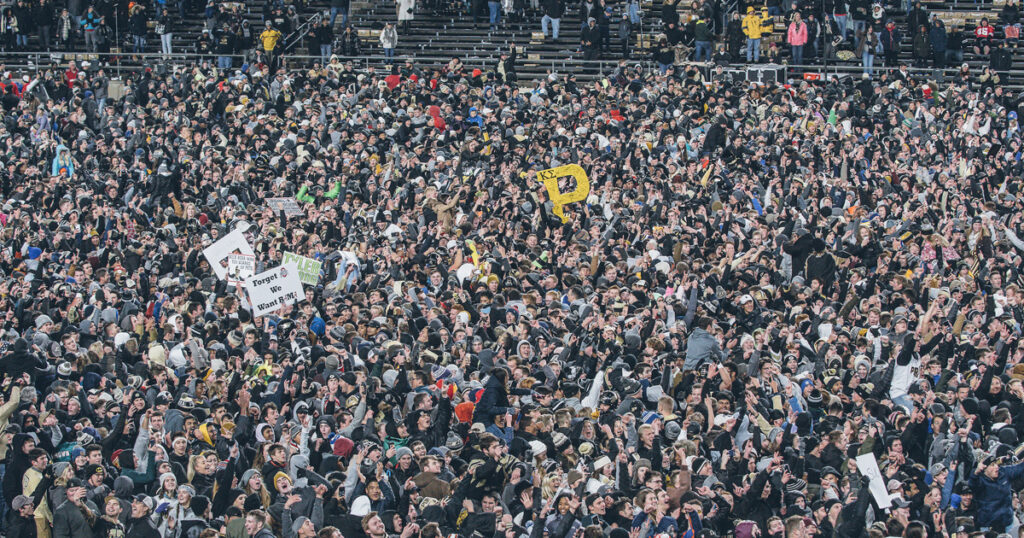
The matchup against Ohio State had a built-in layer of emotion that would be difficult for the Buckeyes – or any team – to match based on all the factors leading up to kickoff. Once the game started, destiny took over.
“There’s a build-up and something else beyond the game that’s going on,” Purdue athletic director Mike Bobinski said. “One of the things that game highlights to me is the role of emotion, momentum and you’ve got a bunch of young people out there playing and they’re affected by an external thing.
“The incredible Tyler Trent story and him being embraced by the football program in a unique way, his willingness to be embraced and his family’s willingness for that to happen. Anybody who says it had nothing to do with it is a denier.
“I don’t know how to say it other than it had a magical feel to it.”
There’s no need to rehash the details of the lopsided win. Five years later, the story is about how the series of events touched the lives of everyone involved along with strangers, and the continued inspiration of Purdue’s “Superfan,” who clearly defined what a Boilermaker is.
“I was inspired by him and his fight and his pride,” said Blough, now a member of the Detroit Lions. “I remember thinking, ‘I will do anything for that kid.’ I would run through a wall just to make him feel loved and cared for because we felt like he was part of the team.”
“THIS IS MY WELCOME BACK TO PURDUE”
It was important for Craig Combs to meet at the gates of the old student section on the east side of Ross-Ade Stadium.
To the left is where Tyler and his friend Josh Seals camped out, setting up a tent in the corner the night before the Michigan game. This area was known as the Tyler Trent Student section before the entrance was moved to the south end zone during the recent renovation.
Enthusiasm was building early that season under first-year coach Jeff Brohm and the longtime friends and current students were more than eager to support a program that had endured five straight losing seasons and lacked direction.
Brohm was starting to change the outlook and Trent and Seals wanted to be at the forefront of igniting the student community.
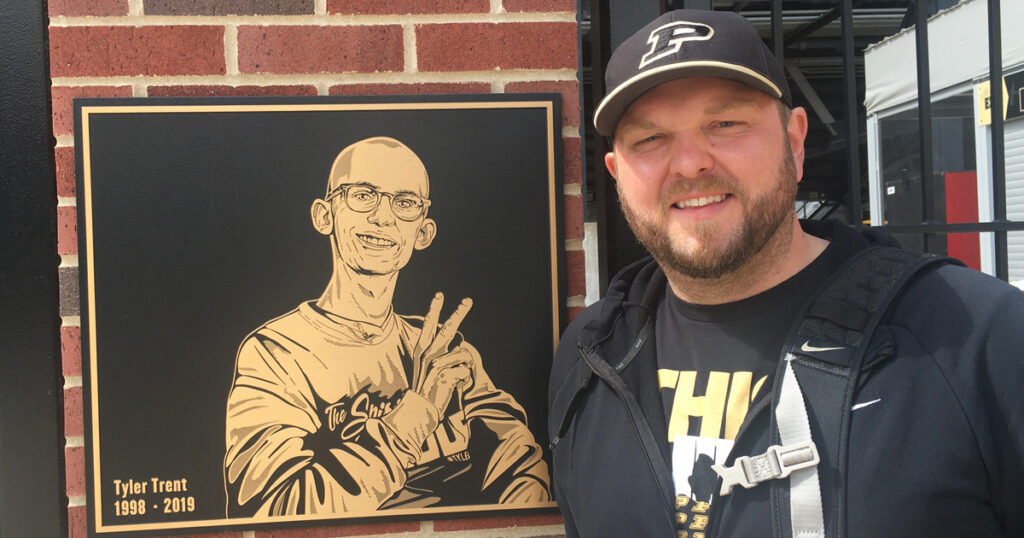
In 2017, and even a year later, Combs was nowhere near West Lafayette and never heard of Trent. For nearly a decade, Combs pursued his dream of becoming a professional wrestler. He couldn’t secure a contract and to support his wife and two children, Combs found work at the Belvidere Assembly Plant near Rockford, Illinois.
In early 2018, the pursuit of professional wrestling ended. And then Combs lost his job at the assembly plant.
“My life wasn’t in a great place,” Combs said.
Combs hadn’t followed college football for five or six years before the middle of the 2018 season and lost his connection to Purdue. His great uncle – Ed Rose – was a student in the 1960s and Combs attended his first game at Ross-Ade Stadium when he was 12. He also watched the Boilermakers play Northwestern in 2001, but Combs drifted away from the university for more than two decades.
The two started to come together five years ago this month.
The TV was on ESPN the morning of Oct. 20, and the announcers teased an emotional story about a 20-year-old Purdue student for a segment on the network’s popular GameDay show.
“It woke me up. They don’t ever talk about Purdue on ESPN,” Combs recalled.
Tom Rinaldi, sports television’s No. 1 storyteller who now works for FOX, shared Trent’s personal battle, the progression of his illness that prevented him from returning to school and his deep connection to the football program, the players and the university and cancer community.
“At the end of the story – as I’m sure most people were – I was very emotional and it touched me in a pretty significant way,” Combs said. “I rolled over and said, ‘I’m going to be there.’ I don’t know how. I don’t know where.
“This 20-year-old student at Purdue who’s going through cancer, I need to be there for this. This is my welcome back to Purdue.”
One issue – Combs was scheduled to work that day. Once his shift was finished, he and a friend drove 3 ½ hours, arriving with three minutes left in the first quarter. He didn’t listen to the game broadcast on the radio. He didn’t look at the scoreboard until he found his seat.
“I walked into the stadium and Purdue had just scored a touchdown,” Combs said. “The walk up the stairs turned into a sprint up the stairs because I had to get in the stadium.”
Throughout the night, Combs kept looking in the direction of Trent and his family, who were seated in a fifth-floor suite. Combs was mesmerized by the events – the 29-point victory over one of the nation’s top teams that suffered its only loss of the season, Trent’s personal story and a rekindling of his love for the school.
“Leaving here that night, I couldn’t think of anywhere else I wanted to be,” he said. “It was staring at me the whole time; I wasn’t paying attention.”
After arriving back home, Combs applied for admission to the university. He was denied entrance to the business school. He applied to the communications program on the second attempt and was accepted.
He lived in Rockford, Ill. and “went to school at Purdue in my bedroom” the first year. The now 35-year-old moved his family to West Lafayette the next year and remains in the communications program where Combs is pursuing a career in broadcasting under the direction and leadership of Cory Palm, who serves as director of broadcast services for the athletic department.
He broadcasts games on Big Ten Student U and works for FOX’s Big Noon Kickoff pregame show and BTN. Combs contacted Tony and Kelly Trent about working at the summer charity golf tournament in Carmel that carries Tyler’s name and raises money for cancer research.
“We didn’t know any of this,” Tony said of Combs. “Tyler’s story brought him out of a depression he was going through because he thought his life was a disaster. If that young man can do this, ‘I can do something with my life’ is the message.
“It boggles my mind. I wish Tyler could hear the stories, and that’s just one story that came from Tyler’s perseverance and not giving up.”
Combs called the Trents “two of the most amazing people I’ve ever met” and their impact on his life can’t be put into words.
“The gifts Tyler continues to give after the fact are, I don’t know if I deserve them,” Combs said. “I was emotional walking up here. His parents will never understand how much his story means to me and my family. If not for him, I wouldn’t be here.”
“TYLER WAS MY ROLE MODEL”
One of the lasting and emotional images from the night was Tyler’s younger brother, Ethan, pushing his wheelchair on the sideline behind the Purdue bench with the Boilermakers comfortably ahead.
Fans are shouting Tyler’s name from the stands as the clock ticks toward zero.
“He was so proud to be the one pushing his wheelchair that night,” Kelly said. “That sticks with him. He was the one who wanted to take good care of Tyler and help him as much as he could. I know he’s proud to be Tyler’s brother.”
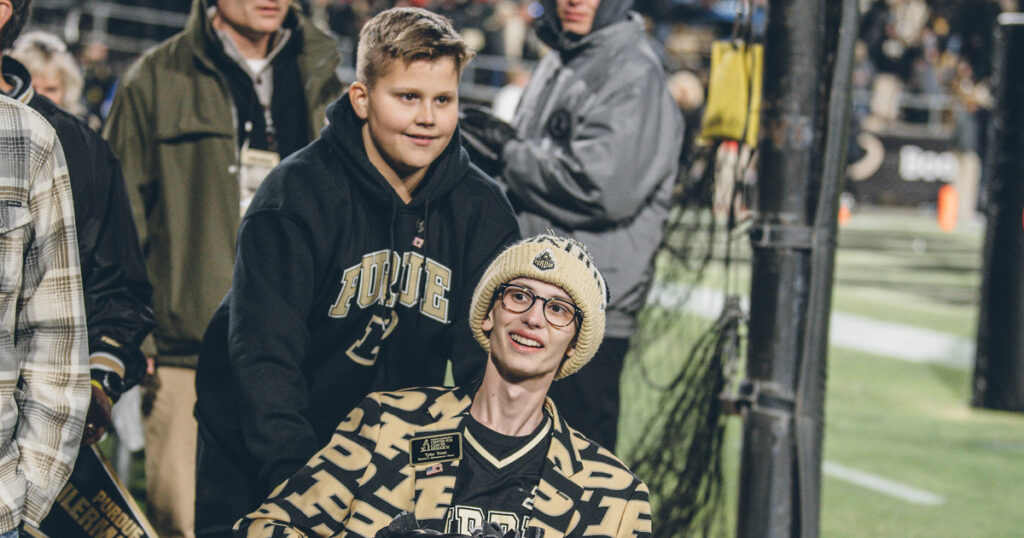
Five years later, Ethan is a member of coach Ryan Walters’ program. The offensive lineman who played at Carmel committed to Indiana State but accepted a walk-on offer from Walters to join the Boilermakers. He’s expected to be in uniform Saturday.
“I feel joy when I think about that night because it’s the night that allowed Tyler the platform to get his story out there and share the message he wanted to share. It’s hard to forget that,” Ethan said.
He reflected on the events, calling it “surreal” and thought of joy when remembering pushing his brother’s wheelchair in front of a sold-out stadium.
When Tyler attended events, Ethan was pushing his wheelchair.
“Tyler was my role model and the guy I go to for advice because he was six years older than me,” Ethan said. “That was a normal thing for me to push his wheelchair because I wanted to spend as much time with him as I could.”
Ethan still carries Tyler’s traits and characteristics with him.
He had Tyler’s ‘T2’ moniker tattooed on his wrist before his senior year in high school. The fight Tyler showed will always be a part of Ethan. He keeps a picture on a mirror in his bathroom that he looks at every morning and every night before going to bed.
“It’s a picture of his hand while he was in the hospital – it says, ‘never give up.’ ” he said.
“I BELIEVE IN DIVINE INTERVENTION”
No Boilermaker had a stronger connection to Tyler than Blough.
They shared a similar faith, and their relationship grew as Tyler became an integral part of the program. Blough was one of five team captains to deliver the game ball the day after the 2018 victory over Nebraska. On the day of the game, Tyler announced he wasn’t returning to school since he was in declining health and needed more extensive care at home. Word quickly reached the team in Lincoln.
This was three weeks before the Ohio State game.
“That was the first time we realized, ‘man, this isn’t looking good,’ ” Blough said. “For a lot of us, experiencing somebody who was going through that was a wake-up call to us and what he was really battling with. You hear the story, you hear about him camping out for the Michigan game the year before and I got to walk with his family the next year. To see him in the bed really struggling made it real for us.”
Those within the program knew of the GameDay feature and the players watched from their hotel rooms.
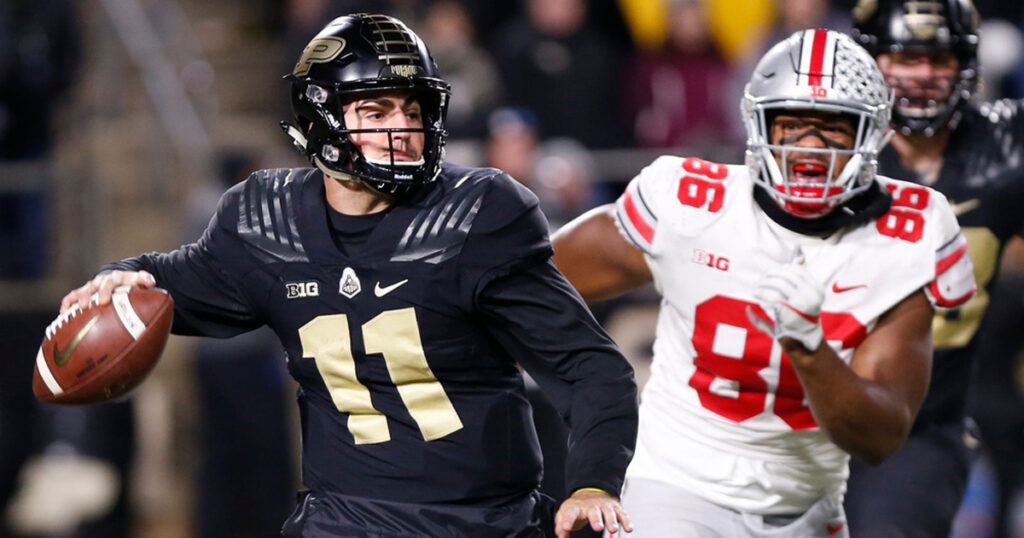
They knew the story but seeing it brought out another level of emotions.
“After the piece aired, I remember being on FaceTime with (offensive lineman) Eric Swingler, who was 10 hotel rooms away from me,” Blough said. “I was bawling. We could’ve watched it together but I’m FaceTiming him and I’m crying my eyes out. He’s crying. I told him, ‘Let’s do this tonight.’
“You know how I am – I believe in divine intervention. It was really special.”
During the ESPN feature, Tyler predicted a Purdue victory, which wasn’t a surprise. Two days before kickoff, he told a local sports reporter the Boilermakers would win 24-21.
But Tyler already knew what was going to happen. He informed his dad before the season Purdue was going to take down the Buckeyes.
“He went through all the analytics,” Tony said. “He went through all this stuff. He said. ‘Dad, I think Purdue can beat Ohio State.’ ”
Tyler wasn’t the only one to predict a Purdue victory. Blough and the Boilermakers had found their stride, recovering from an 0-3 start to win back-to-back games heading into their open week before facing Illinois.
Blough surprised his mom with a trip back to Texas and also stopped by his middle school to deliver a speech.
“I remember telling the kids at my middle school, ‘Don’t be surprised when we beat Ohio State two weeks from now,’ ” Blough said. “I just had the confidence that we were finally clicking, we were playing at a high level. I remember thinking that the whole week – ‘We can hang with these guys.’ We have Rondale Moore. They didn’t have anybody who could cover him.”
The mood around the program was one of “belief,” said Justin Sinz, a former tight end with the Boilermakers who was a graduate assistant five years ago and is currently an offensive analyst under Walters.
While the confidence was high, along with a three-game winning streak after beating Illinois, Tyler’s situation helped amplify the confidence.
“We were big underdogs and if we were playing the game on talent, yes, they were more talented than us,” Sinz said. “Taking that chip on your shoulder mentality and knowing what Tyler was going through was a reminder, ‘Hey, we have a tough task in front of us but let’s not forget other people who are close to the program are dealing with things that are bigger than football.’ That was a rallying cry.”
A pregame skirmish between the teams added to the energy before kickoff and showed Sinz the Boilermakers were ready.
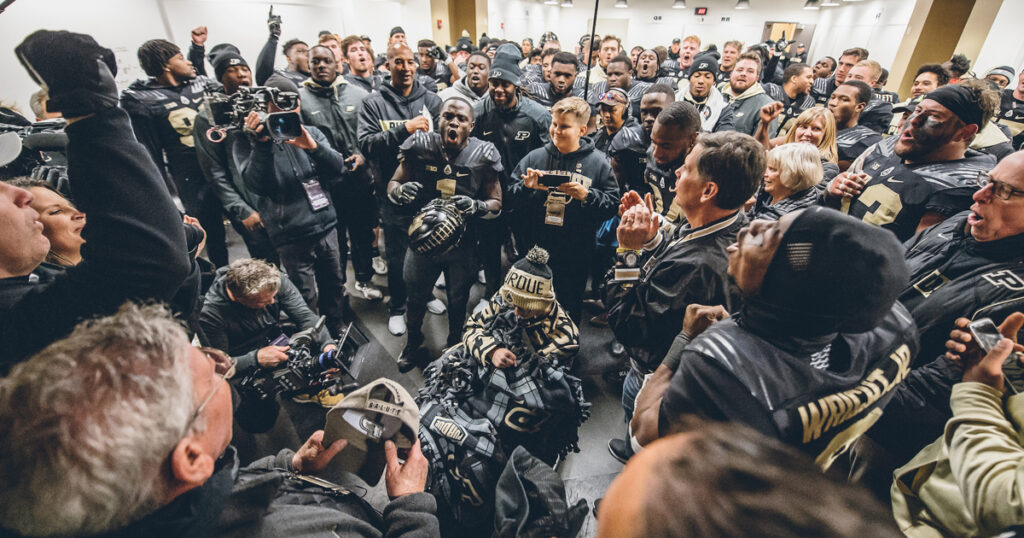
“There wasn’t one dude on our team who didn’t think we could win,” Sinz said. “Maybe some of that was false belief, but no dudes were backing down.”
Top 10
- 1Breaking
Kenny Dillingham
Nearing extension with ASU
- 2Hot
LaNorris Sellers
Close to finalizing deal
- 3
Michigan Coach Search
Three names to watch
- 4Trending
Marcus Freeman
NFL interest growing
- 5
Scott Frost sues Nebraska
Coach takes Huskers to court
Get the Daily On3 Newsletter in your inbox every morning
By clicking "Subscribe to Newsletter", I agree to On3's Privacy Notice, Terms, and use of my personal information described therein.
In the aftermath of the crowd storming the field, Blough never made it to the locker room for Tyler’s postgame speech. He was told to stay on the field for an interview with ESPN sideline reporter Maria Taylor. It never happened.
But inside the locker room, Tyler briefly spoke to the team and later made an opening statement at the postgame press conference before a plethora of media.
“The joy of the win and the reality of seeing him and you knew he wasn’t in a great spot but how much energy he still had, smiling and enjoying the moment,” Sinz said. “I remember being emotional and I wasn’t super close to the situation, but I was choked up.
“The game is on national TV, he predicts us to win, he’s battling through all of this and now he’s down here in the locker room.”
“LET’S GO TO THE GAME”
The week leading up to the game was difficult for the Trents.
Tyler wasn’t feeling well. He was in and out of the hospital as doctors attempted to keep the nephrostomy tubes placed in his kidneys from leaking. Tyler was first diagnosed with osteosarcoma in his right shoulder in 2014 and later a new tumor was found on the bottom of his pelvis, requiring hip surgery.
As of Friday night, Tony and Kelly were convinced Tyler wouldn’t make the trip to West Lafayette. Plans for the hairdresser, who was scheduled to paint the motion P on the side of Tyler’s head – at his request – were put on hold.
Tony said Tyler had a severe migraine headache, which was a recurring symptom.
“ ‘Dad, I don’t think we’re going to go tomorrow,’ ” Tony recalled. “I told him, ‘Let’s make the decision in the morning and see how you feel.’ ”
And the next morning?
“ ‘Dad, I feel really good today. Let’s go to the game,’ ” Tyler told Tony.
ESPN had a crew following Tyler and his family and Secret Service personnel were on hand to make the journey to West Lafayette as smooth as possible. Moving Tyler was physically hard for the family because of the medical equipment attached to his body and the wheelchair.
“He was heavy,” Kelly said.
Once at the stadium and inside the suite, there was a constant flow of well-wishers and even strangers wanting to see and take pictures with Tyler. The pilots who operated the military planes for the pregame flyover brought Tyler a flag.
“I think they might have broken the fire code,” Kelly said with a smile.
The suite was crowded. People shuffled in and out, waiting for others to leave. Some people remained for a minute or two. Others stayed longer.
“I’m surprised Tyler made it through,” Kelly said. “Tony wasn’t kidding when he said there was a higher power. God literally gave him the strength and the excitement to make it through that night. It was a long day.
“But Tyler got to experience that fully where the bowl game he didn’t. He was much closer to passing. Knowing he got to soak all of that in and what it did for him and his spirit, I truly believe Tyler lived longer because of Purdue football than he would have.”
The Trents had a hard time actually watching the game, missing key details and moments with the number of people in the suite. They knew the Boilermakers had won in convincing fashion but didn’t know all the specifics.
“It was a very surreal experience – almost out of body,” Tony said.
The Trents stayed at the stadium until around 2 a.m. before returning home, still running on adrenaline but exhausted.
“To be honest, I don’t remember anything that happened after we got in the car,” Ethan said. “We were talking and stuff and saying how much of a blessing it was to get that spotlight. In Tyler’s heart, his goal was to share God and share the gospel. The fact that he got the ability to do that and how big the story was, it was God’s doing. That was great.”
Tony didn’t fully understand the scope until he arrived at the stadium and fans were chanting Tyler’s name. Walking on the field afterward continued to define the reality of the situation.
“It was wonderful, but we started to realize what was going on,” Tony said. “This is bigger than we thought.”
Kelly’s Facebook page was inundated with messages. A Purdue alum in Canada reached out and the two have talked through the social media channel but never met. The Trents have been recognized around the country, either walking on the beach in Florida or sitting in the airport dressed in Purdue clothing.
“They don’t know who we are, but they knew Tyler,” Kelly said. “Sometimes, I won’t tell them and we just have a conversation.”
They heard plenty of stories. One came from China where a young man had a Purdue shirt on and was approached by a gentleman.
“ ‘ Hey, I know Purdue. Purdue is engineering and Tyler Trent,’ ” Tony said. “To know your child had that kind of impact on the world is so humbling.”
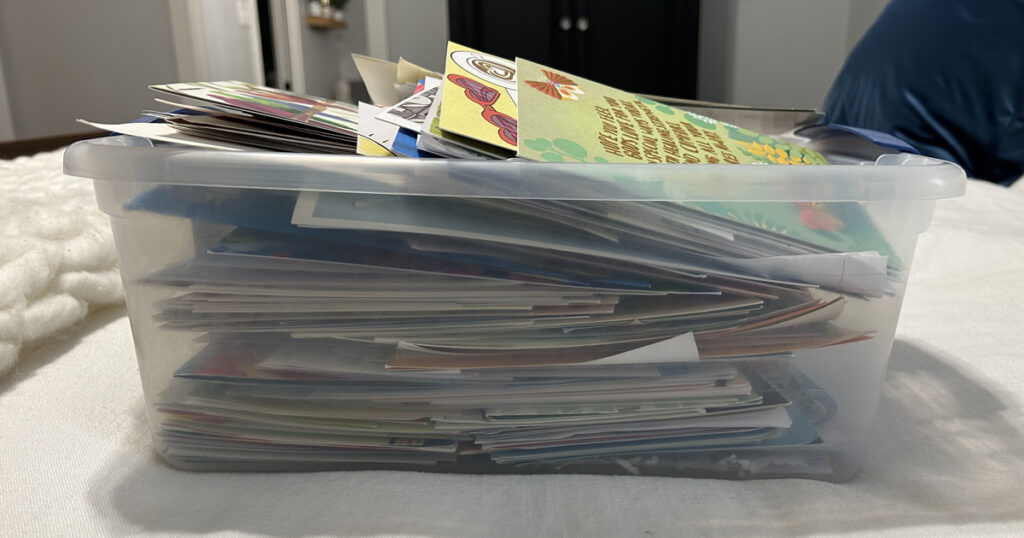
Greeting cards started to arrive in the mailbox, mostly from Ohio State fans who expressed their sympathy for Tyler’s situation and offered prayers and support. Most of the messages followed a similar theme.
“If we could lose to anybody, we’re grateful to lose to you. We know how much it meant for you, your family that you won,” Kelly relayed. “It says a lot for Ohio State fans to say that.”
The stack of cards grew after Tyler’s passing in January, and Ohio State fans continue to correspond with the Trents. The cards currently reside in a plastic tote inside the family’s den.
“We got a stack of cards that was 12 inches tall from Ohio State fans in the mail. I’m not exaggerating,” Tony said.
“HE DEFINED WHAT A BOILERMAKER IS”
Tyler died Jan. 1, 2019.
“We were told in May 2018, he had two weeks to two months,” Kelly said.
Since Tyler associated himself with the Purdue Cancer Center for Research (now called the Purdue Cancer Institute), becoming the first student to serve on the organization’s board, more than $4 million has been donated to his endowment through various sources.
Saturday is the annual Hammer Down Cancer Game. It’s not a coincidence.
“That’s a connection we don’t want to ever deny,” Bobinski said. “It was a real moment, an incredibly touching and positive moment. We don’t want that memory to fade.”
The short-term impact of the victory was immediate. It raised the profile of the program in the second season under Brohm, who conducted more than 25 interviews with national media the next week.
“We heard from people that had nothing to do with Purdue,” Bobinski said. “They just happened to be watching that game on that night, heard the story and saw the result. It was a pretty special moment that had legs that were pretty significant.”
Along with continued awareness of cancer research, the long-term impact of that night remains visible around the athletic department and university.
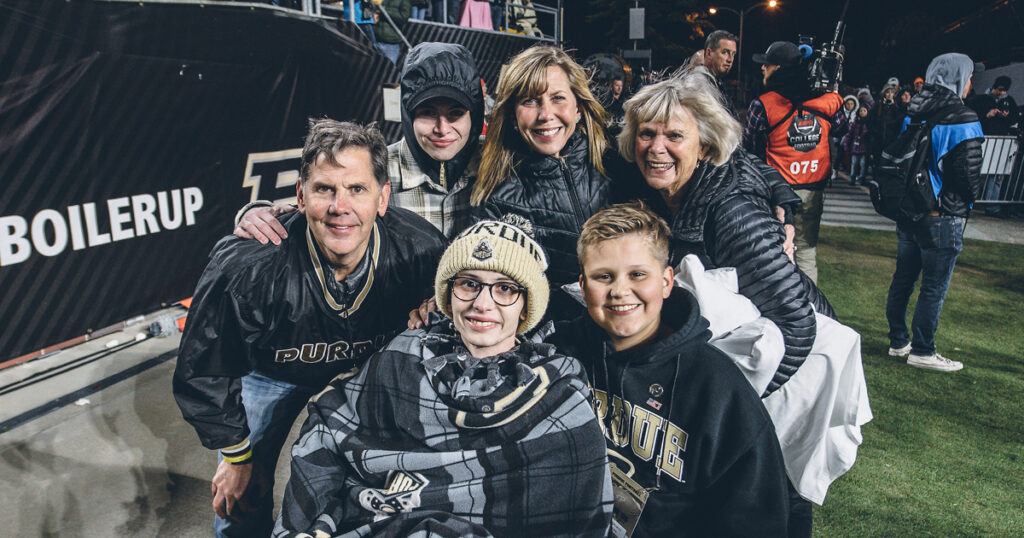
The Tyler Trent Student Entrance remains a significant part of the stadium and the Tyler Trent Courage and Resilience Award was established to award a scholarship to an undergraduate student at the West Lafayette campus who encountered serious or similarly daunting adversity in their pursuit of a degree.
Tony and Kelly work daily to keep Tyler’s memory and mission alive. They don’t want people to forget not only Tyler but the pain that families go through by watching a child die of cancer and other illnesses.
The characteristics that connected people to Tyler – his perseverance, his bravery, his never-give-up attitude and his smile – will always remain part of his fabric as his dream to find a cure for cancer moves on.
“I tell people all the time, I’d much rather you bring it up than not bring it up at all,” Kelly said. “If you think I’ve forgotten, I haven’t. It’s always there. We’re trying to teach people and help people who know others who are going through hard times.
“There’s an element that keeps him alive for that. I know that might sound weird, but it says that he’s still current and still with us and making an impact.”
Purdue is a special place and the Trents will always be grateful for how the athletic department, the football program, and the university community embraced their son and the class they showed in handling his situation.
“If this was any other university, the story wouldn’t be what it is,” Tony said. “And what they did for Tyler and to honor him with the gate, I think about the unique company he’s keeping and thinking about other prestigious alumni.
“All of these people have a rich heritage and here’s my son, who didn’t do anything other than to teach people how to live and be a Boilermaker. He defined what a Boilermaker is. I think Tyler has defined what that means more than any other person who has attended the university. I’m proud of that.”
Related: Tyler Trent Pediatric Cancer Research Center to open at Purdue
Tony/Kelly Trent talk about the 5-year anniversary and son Tyler’s legacy (video)








